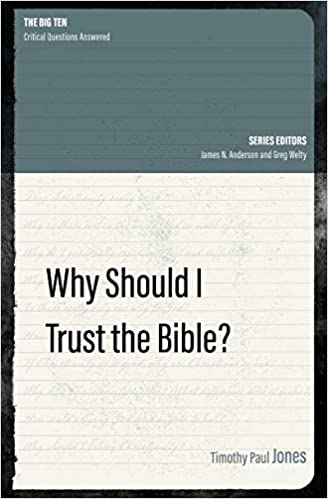A Brief Book Summary from Books At a Glance
by Kirsten Birkett
About the Author
Timothy Paul Jones serves as the C. Edwin Gheens Professor of Christian Family Ministry, vice president for doctoral studies, and chair of the department of apologetics, ethics, and philosophy at The Southern Baptist Theological Seminary. Dr. Jones also serves as one of the pastors at the Midtown congregation of Sojourn Church in Louisville.
Contents
- A Difficult Book to Believe?
- Were the Gospels Written to Tell What Happened in History?
- Are the Gospels Historically Plausible?
- Which Books Belong in the Bible?
- How Much of the Bible Must I Trust?
Appendix: How Accurately Was the Bible Copied?
Overview
A popular-level book that discusses common objections to biblical belief. The book is addressed to those who may be familiar with criticisms of the Bible, particularly from modern “New Atheists.” The author writes: “What I want to do is simply to sketch out one possible pathway that a reasonable person might take that would lead him or her to trust that the Bible is true.” Each chapter is followed by a brief reading list of resources to follow up.
Chapter 1: A Difficult Book to Believe?
“The Bible is a difficult book to believe,” the book begins. The Bible contains miraculous deeds and improbable history. Many people trust it all too easily, without reflection; many thoughtful people have also decided it is true. This book is written for the thoughtful, skeptical reader. The author describes his own journey from unquestioning faith, to rebellious atheism, to renewed, better-informed faith. He grew up in a culture in which any questioning of Scripture was met with outrage and fear, and his discovery of biblical difficulties in college led him to doubt. Reading C. S. Lewis’ Surprised by Joy revealed, however, that “a rejection of faith wasn’t the only possible response to the deluge of difficulties I was now glimpsing.” A new, stronger faith emerged. Although many believe the current atheistic strapline that faith is in opposition to evidence, this completely misconstrues “the nature and function of faith.” Any faith – scientific, historical, or otherwise – intelligently understood, both needs evidence to be reasonable and can never live up to a proof of “absolute certainty.” “At its best, faith is confidence that’s grounded in evidence.” . . .
[To continue reading this summary, please see below....]The remainder of this article is premium content. Become a member to continue reading.
Already have an account? Sign In
